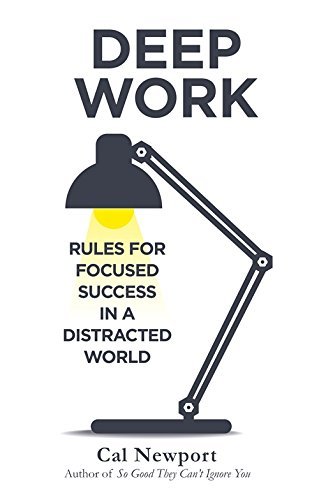Book Review | Deep Work by Cal Newport
Newport’s book offers valuable advice on maximizing focus in a world of constant distractions. The principles he presents can benefit anyone seeking greater productivity. Deep Work encourages readers to reshape their work habits for long-term success and satisfaction.
Deep Work: Rules for Focused Success in a Distracted World by Cal Newport guides readers to achieve intense focus. Newport, a professor and productivity expert, argues that deep work is increasingly rare but essential. This ability to concentrate on demanding tasks without interruption is vital for excellence. In this Deep Work book review, we explore Newport’s core ideas and strategies. His methods can help cultivate a deep work habit, boosting both productivity and personal fulfillment.

Defining Deep and Shallow Work
Newport distinguishes between “deep work” and “shallow work,” two contrasting types of tasks. Deep work consists of cognitively demanding activities that produce high-value results, like writing, complex problem-solving, or developing a new skill. Newport contrasts this with shallow work, which includes low-value, low-concentration tasks like responding to emails, scrolling social media, or attending nonessential meetings. He argues that shallow work is often a productivity drain that limits professionals from making significant progress in their fields.
- Deep Work: High-concentration tasks that require intense focus and yield meaningful outcomes, such as writing, coding, or studying.
- Shallow Work: Tasks that are low in cognitive demand and produce little value, such as checking email or scheduling.
- Value of Deep Work: Newport believes deep work is a “superpower” that can give individuals a competitive edge in a knowledge-based economy.
- Challenges in Modern Life: Modern work environments, filled with interruptions, make it harder to engage in deep work consistently.
By making this distinction, Newport illustrates how many people, particularly knowledge workers, spend much of their time on shallow work rather than investing in deep work. He suggests that this shift in focus, if embraced, could drastically improve both the quality and quantity of one’s achievements. This Deep Work book review underscores Newport’s belief that mastering deep work is crucial for standing out in today’s fast-paced world.
The Four Core Principles of Deep Work
In the second section of self-help book Deep Work, Newport introduces four key principles designed to help readers develop habits that support focused, high-impact work. Each principle addresses a unique challenge in building deep work routines and suggests practical techniques for overcoming distractions. The first principle, “Work Deeply,” emphasizes the need to create routines and environments that foster intense focus. Newport suggests different approaches to scheduling deep work, including the “monastic” approach, where one isolates for extended periods, and the “rhythmic” approach, which involves daily focus blocks.
The second principle, “Embrace Boredom,” encourages people to resist the urge for constant stimulation. Newport explains that our addiction to digital distractions has lowered our tolerance for boredom, weakening our focus. By learning to tolerate boredom, we strengthen our ability to remain engaged without distraction, a key skill for deep work.
The third principle, “Quit Social Media,” proposes a “digital detox,” suggesting that we minimize social media use, which often drains attention without providing substantial value. Newport argues that for those looking to master deep work, it’s crucial to be selective about digital tools, using only those that genuinely contribute to personal or professional goals.

Finally, Newport’s fourth principle, “Drain the Shallows,” encourages readers to reduce shallow tasks like frequent meetings or email checks. He suggests setting specific times for these activities to minimize interruptions to focus time. These principles, as explored in this Deep Work book review, serve as a foundation for Newport’s system of productivity, helping readers structure their time around tasks that generate real value.
The Value of Focus and Digital Detox
In Deep Work, Newport emphasizes the need for intense focus and an “attention diet” to protect our mental energy. He argues that in the age of constant digital distractions, quitting or minimizing social media can be transformative.
“To leave social media altogether is extreme,” he writes, “but it’s a path to reclaiming control over your time.”
Newport acknowledges that while not everyone needs to quit entirely, reducing digital distractions greatly enhances our ability to engage in meaningful, uninterrupted work.
The concept of a digital detox aligns with Newport’s idea of “attention restoration,” which suggests that going offline can recharge our mental energy, making us more productive. Newport also encourages “productive meditation,” where one focuses on a professional problem during simple activities like walking. This technique helps build focus over time, training the mind to stay engaged on deep work without seeking external stimulation.
In this book , Newport’s perspective on digital detox is a core element. His approach offers a refreshing perspective in a world where constant connectivity is often seen as a necessity. By highlighting the cognitive benefits of less screen time, Newport provides a practical strategy for reclaiming mental space and building focus
Strategies for Building a Deep Work Habit
Newport’s strategies for integrating deep work into daily routines include specific methods for scheduling focus time, limiting distractions, and batching shallow tasks. In his fourth principle, “Drain the Shallows,” he provides practical tips for reducing shallow work. Newport encourages readers to schedule their day intentionally, designating specific times for deep work and setting boundaries around shallow tasks.
- Daily Scheduling: Newport recommends planning dedicated deep work periods to create consistency and build a habit of focus.
- Limit Meetings: By setting a strict meeting schedule, individuals can minimize interruptions and protect focus time.
- Reduce Email Dependency: Limiting email checks and grouping responses together can help reduce time spent on shallow work.
- Productive Meditation: Newport suggests this as a method for building concentration by focusing on complex problems during physical activities like walking.
These strategies make deep work attainable, even for busy professionals. Newport acknowledges that achieving deep work requires significant effort and commitment. He emphasizes that the rewards are worth it. Higher productivity, job satisfaction, and a sense of accomplishment await those who persevere. In this Deep Work book review, Newport’s focus-building methods show that intentional changes make deep work mastery achievable.

Final Thoughts on Deep Work’s Relevance and Application
Newport’s Deep Work is a valuable read for those seeking to improve productivity and focus, especially in a culture that often prioritizes constant engagement over meaningful work. By advocating for a disciplined approach to concentration, Newport provides a roadmap to achieving higher-quality results in less time. He explains that mastering deep work can bring about both professional success and personal satisfaction, which is why this Deep Work book review highlights the book’s relevance for knowledge workers, students, and anyone seeking meaningful productivity.
While Newport’s advice may seem intense to some, especially his views on digital minimalism, the concepts he presents are versatile and applicable across various fields. This review of Deep Work underscores Cal Newport’s belief that focusing on high-value tasks can lead to a more fulfilling life. For those willing to invest in their focus and eliminate shallow distractions, Newport’s book is both inspiring and actionable.






